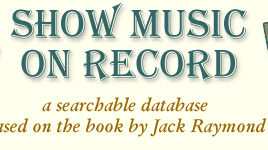
|

|

|
About the DatabaseShow Music on Record provides discographic information for all commercially-released recordings of theatrical musicals, film and television musicals, and other productions that included songs. In addition to listings of original cast recordings of American shows produced for the stage, screen, and television (and of foreign shows that played in the U.S.), the database includes commercial recordings of later albums and medleys from shows, individual show tunes performed by members of original, revival, and studio casts, records of composers performing their own show songs, and selected additional recordings of related interest. Which Shows Are Included?Stage Shows
Motion Pictures and Television Programs
Additional Types of Shows
Which Shows Are Not Included?
Which Albums and Medleys Are Included?In general, any English-language album or medley that contains representative selections from a show's score, including:
Which Albums and Medleys Are Not Included?
Which Individual Records Are Included?
Which Individual Records Are Not Included?Show songs performed by people who had nothing to do with a production of the show. A Few AnomaliesIf a well-known American star made records of songs he or she sang in a London show, those records are listed even though the show does not otherwise qualify for inclusion, and even though other songs from the show are not listed. Although practically all of the original cast performances listed are songs, a few sketches of special interest are also provided, including Reginald Gardiner's records of his "Trains" monologue from At Home Abroad; Richard Haydn's "Fish Mimicry" from Set to Music; and Willie Howard's "Comes the Revolution!" from My Dear Public.
A few original cast recordings produced in
limited pressings for members of the production
have been included, despite the fact that they
are not "commercial" recordings. |
|
The Library of
Congress >> Recorded Sound
Reference Center May 17, 2004 |
Contact Us |